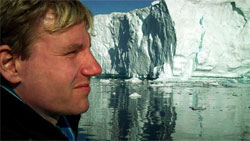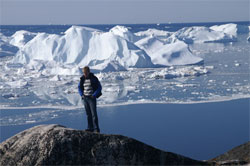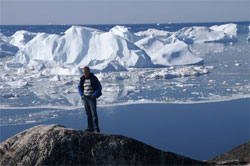I had a professor in graduate school who was fond of saying that if you allowed him to define the terms of debate he would win every argument.
Perhaps the truth of his assertion is one reason why so many contemporary debates about polarizing issues—abortion, global warming, stem-cell research, gay marriage—descend so quickly into meta-arguments. I tell first-year writing students that there’s a difference between winning the rhetorical argument and actual persuasion. We invest so much time in the former, often to the point of not caring about how we win the argument, that we frequently fail miserably at the latter.
Polemics in the form of documentary, like political speeches or ads, too often invest all their energy in revealing the tricks of their opponents’ trade rather than advancing their own arguments. They are all rebuttal (condemnation, actually), no affirmative argument. For the first thirty minutes or so of Cool It—Ondi Timoner’s documentary about “skeptical environmentalist” BjØrn Lomborg—I feared it would fall into this familiar pattern of preying on political associations and identity politics to simply make barbs about those with opposing views and do nothing more.

Funny thing, though, once the film exonerates Lomborg from the mutually exclusive charges that he is a feckless idiot providing ammunition for those who would fiddle while the world burns and a knowing hypocrite who lies for a living, it actually settles down into an interesting, thought-provoking, and useful examination of the pros and cons of various approaches for dealing with global climate change.
It is worth underlining in the strongest possible terms that Lomborg—author of The Skeptical Environmentalist: Measuring the Real State of the World and outspoken critic of An Inconvenient Truth—does not deny climate change. The first words out of his mouth are “global warming is real, and it’s an important problem.” Despite attempts by some media outlets and opponents to paint him as the agonistic antithesis of Al Gore, his only disagreements with global warming activists (at least as presented in the film) are about how to respond to the problem, not whether or not it exists.

Lomborg is openly dismissive of cap-and-trade policies, and he rightly points out that promises to limit consumption are easy to make but seldom kept. He cautions that too much investment in technology that is still in its primitive stages may retard rather than spur development, recommending more investing in research and development than alternative energy sources as they are currently available. He is more open to geo-engineering attempts than those who worry about unintended consequences of trying to compensate for global warming rather than merely slow it. (For a less enthusiastic examination of geo-engineering possibilities, I highly recommend Robert Greene’s Owning the Weather.) Alternative? Controversial? Sure. But there’s nothing here that warrants alarmist silencing of dissenting opinions.
Cool It is not above its own rhetorical tricks to score points. The scene where Lomborg visits his Alzheimer’s-plagued mother comes off as largely out of place and designed to elicit sympathy rather than agreement. The most vocal critic of Lomborg who participates in the film, Stanford’s Stephen Schneider, is edited to sound like a petty, jealous rival, complaining that “[Lomborg] comes from nowhere, he’s published nothing” and yet “he’s constantly cited” by climate change deniers. I generally find the creation of such straw-man opposition to be counter-productive to the ethos of the argument being offered, but I suppose one could argue that these scenes are a necessary reminder that ad hominem attacks and smear campaigns are not tools used by only one side of the political spectrum.
 KONICA MINOLTA DIGITAL CAMERA
KONICA MINOLTA DIGITAL CAMERAThe film is a social and political argument, not a religious one, but it does touch very lightly on the moral implications of social policy. It may actually be on this ground that it is most effective at undercutting An Inconvenient Truth. Gore’s presentation often cites the concept of our generational legacy, questioning the morality of leaving a broken world to our descendants. Lomborg, in contrast, more often focuses on inhabitants of other cultures, powerfully introducing the question of why the (potential) suffering of future generations is looked at more urgently than that of our neighbors (local and global) today.
As I was watching, I asked myself, “Should saving the earth be a higher priority than saving the world?”
Talk About It
Discussion starters- Lomborg asks African children what they think are the most pressing problems facing the world. How would you answer? What problems should we invest the most amount of time and money in trying to fix?
- Lomborg focuses on a cost/benefit approach to addressing the world’s problems. Is this a sufficient foundation upon which to make social policy decisions? If not, what other factors should be considered when deciding how to invest our resources?
- The film criticizes An Inconvenient Truth for using fear tactics to draw attention to a problem. What are (or might be) more effective ways to motivate people to face real problems?
- What is geoengineering? Should it be considered as a means of addressing global climate change? Why or why not?
The Family Corner
For Parents to considerCool It is rated PG for “thematic elements.” There are a few scenes of young children speaking about fear of environmental disaster, and images from newsreel footage (such as the effects of Hurricane Katrina) could be troublesome for children unable to understand them in context. The film shows clips of a commercial with a young girl hanging on to a tree, screaming as she is threatened to be engulfed by flood waters. In a section about the causes and effects of malaria, there is footage of people suffering as a result of malnourishment and/or disease.
Photos © Roadside Attractions.
Copyright © 2010 Christianity Today. Click for reprint information.











